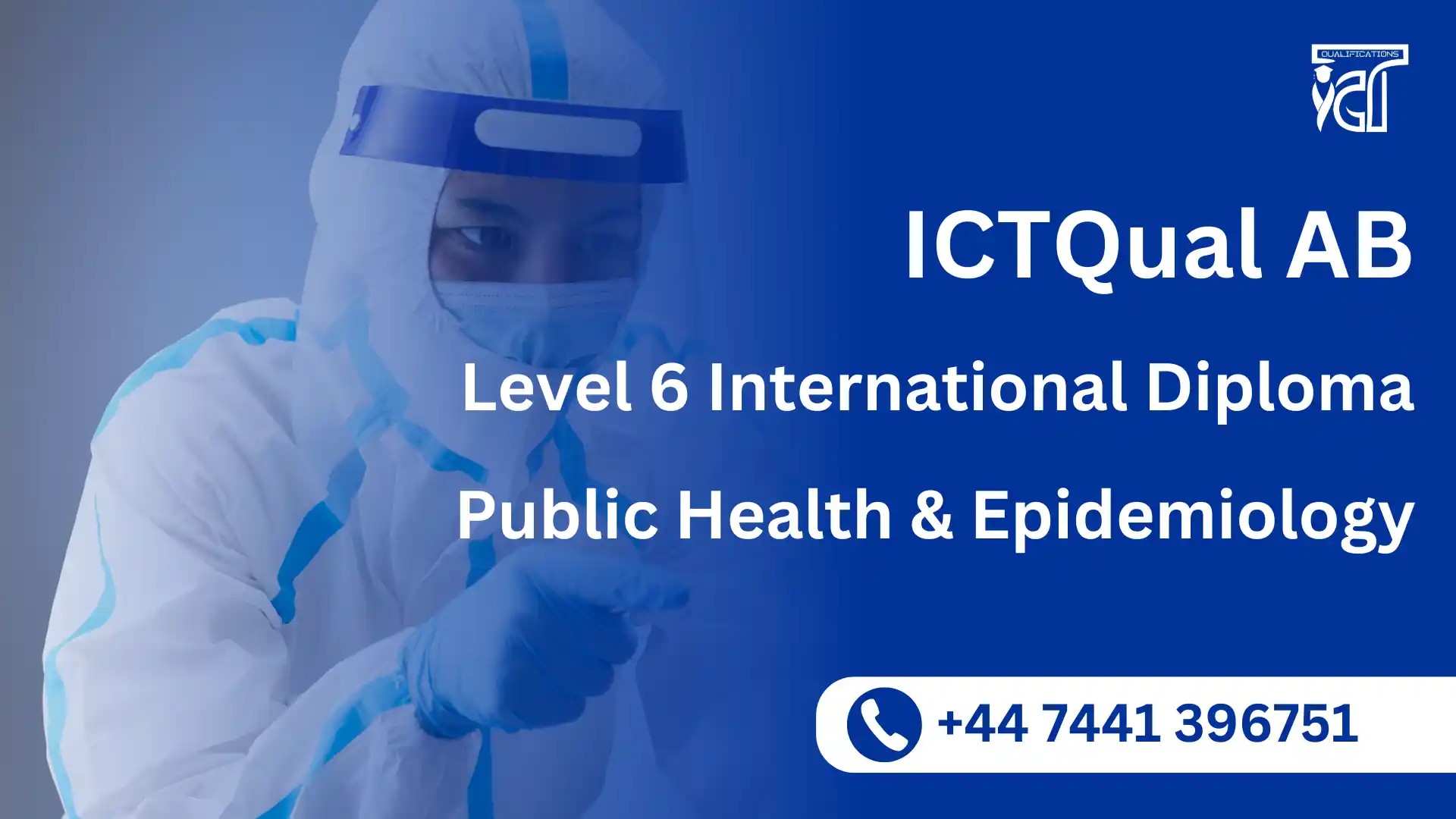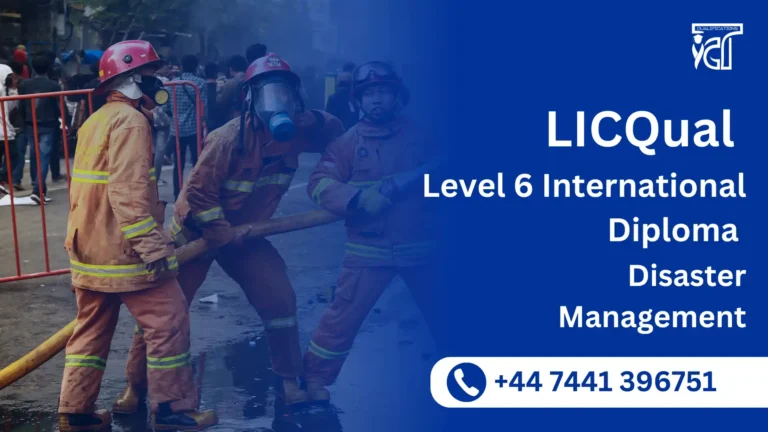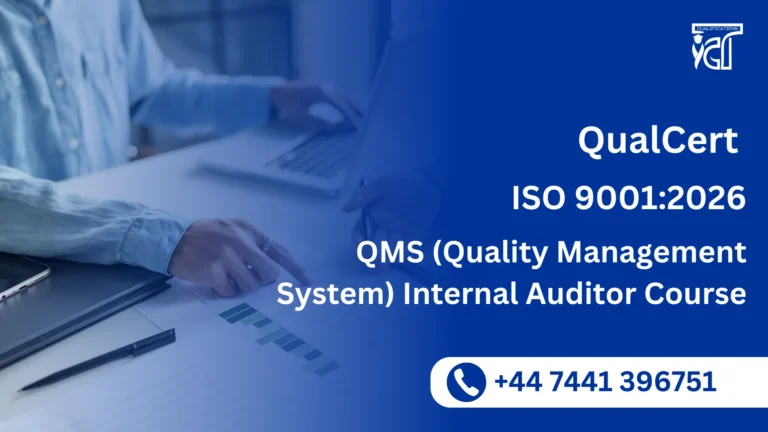The ICTQual AB Level 6 International Diploma in Public Health & Epidemiology is a globally recognised programme designed for learners eager to make a meaningful impact on population health and disease prevention. Whether you are a fresh learner looking to build a strong foundation in public health or an experienced professional aiming to advance your career, this diploma equips you with the knowledge and practical expertise demanded by today’s evolving health sector.
Spanning three years and comprising 360 credits, the programme offers a comprehensive curriculum that blends advanced epidemiological methods, health policy analysis, research techniques, and community health strategies. Learners develop critical skills in analysing health data, implementing effective interventions, and evaluating public health outcomes—skills that are highly valued by employers across government agencies, NGOs, international health organisations, and research institutions.
The ICTQual AB Level 6 International Diploma in Public Health & Epidemiology is particularly relevant for those pursuing roles in epidemiology, health promotion, disease surveillance, and public health leadership. By mastering both theoretical frameworks and applied techniques, learners gain the confidence to address global health challenges, contribute to evidence-based decision-making, and lead initiatives that improve population well-being.
Upon completion, learners can progress to senior-level positions, postgraduate study, or specialist research opportunities. The diploma’s rigorous structure and real-world focus ensure graduates are well-prepared for competitive job markets and international health projects.
With its strong industry relevance and future-focused outcomes, this programme empowers learners to become competent, adaptable, and impactful professionals. It is an ideal choice for those committed to improving community health and advancing their careers in public health and epidemiology on a global stage.
ICTQual AB Level 6 International Diploma in Public Health & Epidemiology
This qualification, the ICTQual AB Level 6 International Diploma in Public Health & Epidemiology 360 Credits – Three Years, consists of 36 mandatory units.
Year 1: Foundation in Public Health & Epidemiology
- Introduction to Public Health
- Fundamentals of Epidemiology
- Human Anatomy and Physiology for Public Health
- Biostatistics and Health Data Analysis
- Principles of Microbiology and Infection Control
- Health Promotion and Disease Prevention
- Nutrition and Community Health
- Environmental Health and Sustainability
- Health Policy and Systems Overview
- Communication Skills for Health Professionals
- Ethics and Professional Conduct in Public Health
- Introduction to Research Methods in Health Sciences
Year 2: Intermediate Public Health Applications
- Advanced Epidemiology and Study Design
- Infectious Disease Control and Prevention
- Non-Communicable Diseases and Chronic Care Management
- Global Health Issues and Health Systems
- Health Economics and Policy Implementation
- Public Health Surveillance and Monitoring
- Occupational and Environmental Health
- Community Health Assessment and Planning
- Health Informatics and Digital Health Systems
- Programme Evaluation and Impact Assessment
- Leadership and Teamwork in Public Health
- Applied Research Methods in Epidemiology
Year 3: Advanced Specialisation and Professional Application
- Advanced Public Health Interventions
- Clinical Epidemiology and Evidence-Based Practice
- Health Risk Assessment and Management
- Biostatistics for Advanced Research
- Global Health Policy and Strategy Development
- Emergency Preparedness and Disaster Management
- Maternal and Child Health Epidemiology
- Advanced Communicable Disease Control
- Health Communication and Advocacy
- Quality Improvement and Risk Management in Healthcare
- Capstone Research Project / Dissertation
- Professional Practice and Field Placement
Learning Outcomes for the Level 6 International Diploma in Public Health & Epidemiology 360 Credits – Three Years:
Year 1: Foundational Knowledge
By the end of Year 1, learners will be able to:
Introduction to Public Health
- Understand the key concepts and principles of public health practice.
- Identify the roles of public health professionals in community and global health.
- Analyse health challenges and determinants affecting populations.
Fundamentals of Epidemiology
- Apply basic epidemiological methods to study disease patterns.
- Interpret incidence, prevalence, and risk factors in populations.
- Design simple observational studies and health surveys.
Human Anatomy and Physiology for Public Health
- Describe the structure and function of major human body systems.
- Understand physiological mechanisms relevant to disease and health.
- Relate anatomy and physiology to public health interventions.
Biostatistics and Health Data Analysis
- Collect, analyse, and interpret health-related data.
- Use statistical tools to summarise and present health information.
- Apply basic quantitative methods to support evidence-based decisions.
Principles of Microbiology and Infection Control
- Identify common microorganisms and their impact on health.
- Apply infection control measures in community and clinical settings.
- Understand pathogen transmission and prevention strategies.
Health Promotion and Disease Prevention
- Design strategies to promote healthy lifestyles and behaviours.
- Implement community-level health interventions.
- Evaluate the effectiveness of disease prevention programmes.
Nutrition and Community Health
- Assess nutritional needs of populations.
- Analyse the impact of diet on public health outcomes.
- Develop nutrition-based health promotion strategies.
Environmental Health and Sustainability
- Recognise environmental factors affecting public health.
- Evaluate sustainable practices to reduce health risks.
- Promote environmental health awareness in communities.
Health Policy and Systems Overview
- Understand healthcare system structures and policy frameworks.
- Analyse policy impacts on population health outcomes.
- Identify strategies to improve public health service delivery.
Communication Skills for Health Professionals
- Demonstrate effective verbal and written communication in healthcare settings.
- Engage with communities to convey health messages clearly.
- Apply interpersonal skills to enhance collaboration with stakeholders.
Ethics and Professional Conduct in Public Health
- Understand ethical principles in public health practice.
- Apply professional standards in community and research settings.
- Evaluate ethical dilemmas and propose appropriate solutions.
Introduction to Research Methods in Health Sciences
- Identify basic research designs and methodologies.
- Conduct literature reviews to support public health research.
- Apply fundamental principles of data collection and analysis.
Year 2: Intermediate Proficiency
By the end of Year 2, learners will be able to:
Advanced Epidemiology and Study Design
- Design and conduct advanced epidemiological studies.
- Analyse complex datasets to identify health trends.
- Critically appraise epidemiological literature for evidence-based practice.
Infectious Disease Control and Prevention
- Develop strategies to prevent and control infectious diseases.
- Monitor outbreaks and implement intervention measures.
- Apply public health guidelines for vaccination and immunisation programmes.
Non-Communicable Diseases and Chronic Care Management
- Understand risk factors and management strategies for chronic diseases.
- Design community-based interventions for disease prevention.
- Analyse health data to monitor chronic disease trends.
Global Health Issues and Health Systems
- Evaluate global health challenges and disparities.
- Examine international health policies and frameworks.
- Propose interventions to address global public health priorities.
Health Economics and Policy Implementation
- Apply economic principles to public health decision-making.
- Assess cost-effectiveness of health interventions and programmes.
- Understand resource allocation in health systems.
Public Health Surveillance and Monitoring
- Implement surveillance systems to track population health.
- Analyse surveillance data to detect health threats.
- Develop reporting strategies for timely public health responses.
Occupational and Environmental Health
- Assess workplace hazards and environmental risks.
- Recommend interventions to promote occupational health.
- Evaluate policies for environmental and occupational safety.
Community Health Assessment and Planning
- Conduct needs assessments for community health programmes.
- Plan and implement interventions based on assessment findings.
- Engage stakeholders to promote sustainable health initiatives.
Health Informatics and Digital Health Systems
- Use digital tools to collect and manage health information.
- Analyse health data to support decision-making.
- Apply informatics solutions to improve healthcare delivery.
Programme Evaluation and Impact Assessment
- Evaluate public health programmes for effectiveness and efficiency.
- Use quantitative and qualitative methods to assess outcomes.
- Develop reports and recommendations for programme improvement.
Leadership and Teamwork in Public Health
- Demonstrate leadership in planning and implementing health projects.
- Collaborate effectively with multidisciplinary teams.
- Apply management principles in public health practice.
Applied Research Methods in Epidemiology
- Design applied research projects in epidemiology.
- Collect, analyse, and interpret health data for research purposes.
- Present research findings to inform policy and practice.
Year 3: Advanced Specialization and Application
By the end of Year 3, learners will be able to:
Advanced Public Health Interventions
- Plan and implement large-scale health interventions.
- Evaluate the effectiveness and sustainability of interventions.
- Develop strategies to address complex public health challenges.
Clinical Epidemiology and Evidence-Based Practice
- Apply clinical epidemiology methods to public health scenarios.
- Integrate research evidence into policy and practice decisions.
- Critically evaluate clinical guidelines and their population impact.
Health Risk Assessment and Management
- Conduct risk assessments for communities and workplaces.
- Develop mitigation strategies for identified health risks.
- Monitor and review the effectiveness of risk management plans.
Biostatistics for Advanced Research
- Apply advanced statistical methods to health research.
- Analyse large datasets using appropriate software tools.
- Interpret complex statistical results to inform public health decisions.
Global Health Policy and Strategy Development
- Develop strategies to address international health priorities.
- Analyse global health policies and their implementation challenges.
- Recommend evidence-based policy solutions for population health improvement.
Emergency Preparedness and Disaster Management
- Plan and coordinate public health responses to emergencies.
- Assess and manage health risks during natural and man-made disasters.
- Develop disaster response protocols and communication strategies.
Maternal and Child Health Epidemiology
- Analyse health indicators for mothers and children.
- Develop interventions to improve maternal and child health outcomes.
- Evaluate public health programmes targeting maternal and child populations.
Advanced Communicable Disease Control
- Apply advanced methods for outbreak investigation and control.
- Develop intervention strategies for emerging and re-emerging diseases.
- Monitor and report on communicable disease trends.
Health Communication and Advocacy
- Design effective health communication campaigns.
- Advocate for public health policies and community engagement.
- Use media and digital tools to disseminate public health messages.
Quality Improvement and Risk Management in Healthcare
- Implement quality improvement strategies in public health programmes.
- Identify and manage risks to improve healthcare outcomes.
- Apply continuous improvement models to organisational practices.
Capstone Research Project / Dissertation
- Plan and conduct a comprehensive public health research project.
- Analyse and interpret research findings to address real-world health issues.
- Present results in a professional report with actionable recommendations.
Professional Practice and Field Placement
- Apply theoretical knowledge in practical public health settings.
- Develop professional competencies through hands-on experience.
- Demonstrate ethical, effective, and evidence-based public health practice.
Completing the ICTQual AB Level 6 International Diploma in Public Health & Epidemiology offers learners a competitive edge in the global health sector. This programme blends theoretical expertise with real-world application, empowering learners to tackle complex health challenges and excel in diverse professional environments.
1. Professional Growth and Career Advancement
- Gain a recognised Level 6 qualification valued by employers worldwide.
- Access opportunities in government health agencies, NGOs, and international organisations.
- Enhance eligibility for senior-level roles in public health, epidemiology, and disease prevention.
- Build a strong foundation for postgraduate study or specialised research pathways.
- Strengthen leadership skills for managing public health programmes.
2. In-Demand Skills Development
- Master advanced epidemiological methods and health data analysis.
- Learn to design, implement, and evaluate public health interventions.
- Develop competencies in health policy analysis and community health strategies.
- Acquire practical knowledge for real-world disease surveillance and outbreak management.
- Improve critical thinking and evidence-based decision-making abilities.
3. Global Relevance and Industry Recognition
- Align with international public health standards and practices.
- Gain insights applicable to global health challenges and local community needs.
- Build a network with peers and professionals in the international health sector.
- Improve employability for roles in diverse cultural and geographic settings.
- Benefit from a structured, 360-credit programme designed for long-term career success.
4. Flexible Learning for Diverse Learners
- Suitable for both fresh learners and experienced professionals.
- Structured for balanced theoretical and practical learning over three years.
- Adaptable for learners aiming to transition between industries or career paths.
- Encourages independent research and self-directed learning.
- Provides a clear progression route to advanced qualifications and leadership roles.
The ICTQual AB Level 6 International Diploma in Public Health & Epidemiology is designed for motivated learners committed to shaping the future of global health. Whether starting your journey in public health or seeking to elevate your professional standing, this diploma provides the flexibility and depth to meet diverse goals.
1. Aspiring Public Health Professionals
- Fresh learners seeking a comprehensive introduction to public health and epidemiology.
- Individuals eager to build a career in health promotion, disease prevention, or community health.
- Learners motivated to make a tangible difference in population health outcomes.
- Those looking to develop skills applicable to both local and international contexts.
- Students aiming for a recognised, career-focused qualification to enter the health sector.
2. Experienced Healthcare Practitioners
- Professionals with a background in nursing, medicine, or allied health seeking advanced expertise.
- Public health workers aiming to progress into leadership, policy, or research roles.
- Learners interested in applying epidemiological methods to real-world health challenges.
- Individuals pursuing career progression within government agencies or NGOs.
- Practitioners seeking to formalise their skills through a globally recognised diploma.
3. Career Changers and Lifelong Learners
- Individuals transitioning from related fields such as social sciences or environmental health.
- Learners passionate about addressing global health issues and improving community well-being.
- Professionals seeking to diversify their skill set for roles in international health organisations.
- Those interested in combining analytical, research, and leadership skills for impactful careers.
- Learners aiming to broaden their professional network within the global health sector.
4. Global Health Enthusiasts
- Learners committed to understanding health trends and challenges worldwide.
- Individuals seeking to engage with culturally diverse health systems and populations.
- Those who value evidence-based practices to influence health policy and planning.
- Learners looking for long-term career stability in a critical, fast-growing sector.
- People eager to become advocates for improved public health standards globally.
Completing the ICTQual AB Level 6 International Diploma in Public Health & Epidemiology opens doors to a wide range of academic and professional opportunities. This qualification equips learners with the advanced knowledge and applied skills needed to progress confidently in their careers or further studies within the health sector.
1. Academic Advancement
- Eligibility to pursue Level 7 or master’s degree programmes in public health, epidemiology, or related disciplines.
- Opportunity to specialise further through postgraduate research or advanced certifications.
- Strong foundation for doctoral-level studies in global health or health policy.
- Access to advanced training in health informatics, biostatistics, or environmental health.
- Enhanced academic profile for competitive scholarship and fellowship opportunities.
2. Career Growth and Leadership Roles
- Progression into senior positions such as Public Health Manager, Epidemiologist, or Health Policy Analyst.
- Opportunities to lead disease surveillance programmes and health promotion campaigns.
- Eligibility for consultancy roles with government agencies, NGOs, or international organisations.
- Increased potential to manage cross-border health projects and global health initiatives.
- Development of leadership capabilities for managing teams and influencing policy decisions.
3. International Opportunities
- Broadened access to roles in global organisations like WHO, UNICEF, and international health research centres.
- Ability to work on international health projects addressing pressing public health challenges.
- Enhanced professional mobility across different countries and health systems.
- Recognition of skills applicable in both developed and developing regions.
- Strong positioning for remote, hybrid, or on-site roles in global public health.
4. Professional Development
- Continuous growth through participation in professional health networks and conferences.
- Opportunities for publication or contribution to research in peer-reviewed journals.
- Development of expertise to mentor or train junior public health professionals.
- Enhanced credibility for roles in academia, policy-making, or advisory boards.
- Lifelong learning potential through access to evolving trends in public health and epidemiology.
Entry Requirements
The ICTQual AB Level 6 International Diploma in Public Health & Epidemiology welcomes learners from diverse backgrounds who are committed to advancing their knowledge and careers in the health sector. To ensure readiness for the programme, the following minimum requirements apply:
1. Minimum Age
- Learners must be 18 years or older at the time of enrolment.
2. Educational Background
- Completion of a Level 5 qualification (or equivalent) in public health, healthcare, life sciences, or a related field.
- Alternatively, secondary education with strong performance in relevant subjects and evidence of academic ability may be considered.
3. Experience
- While prior work experience in healthcare, community health, or epidemiology is beneficial, it is not mandatory for fresh learners.
- Experienced professionals with at least three to five years in a related field are encouraged to apply for accelerated pathways.
4. Language Proficiency
- Learners must demonstrate proficiency in English to participate fully in coursework, discussions, and assessments.
- Evidence may include an IELTS score of 5.5 or equivalent, previous study in English, or other accepted proof of language competency.
Register Now
Qualification Process
Qualification Process for the ICTQual AB Level 6 International Diploma in Public Health & Epidemiology
- Self-Assessment:
Begin by evaluating your eligibility to ensure you meet the qualification requirements, including work experience, knowledge, and language proficiency. - Registration:
Complete your registration by submitting the required documents, including a scanned copy of a valid ID, and paying the registration fee. - Induction:
An assessor will conduct an induction to confirm your eligibility for the course and explain the evidence requirements. If you do not meet the criteria, your registration will be cancelled, and the fee will be refunded. - Assignments & Evidence Submission:
Provide all assignments and the necessary evidence based on the assessment criteria outlined in the course. If you are unsure of the required evidence, consult with the assessor for guidance on the type and nature of evidence needed. - Feedback and Revision:
The assessor will review your submitted evidence and provide feedback. Evidence that meets the criteria will be marked as “Criteria Met,” while any gaps will be identified. You will be asked to revise and resubmit if needed. - Competence Evidence:
Submit final evidence demonstrating that all learning outcomes have been met. This evidence will be marked as “Criteria Met” by the assessor once it is satisfactory. - Internal Quality Assurance (IQA):
The Internal Quality Assurance Verifier (IQA) will review your evidence to ensure consistency, quality, and compliance with standards. - External Verification:
The IQA will submit your portfolio to ICTQUAL AB External Quality Assurance Verifiers (EQA) for final confirmation. The EQA may contact you directly to verify the authenticity of your evidence. - Certification:
Upon successful completion of all checks, ICTQUAL AB will issue your official certificate, confirming that you have attained the ICTQual AB Level 6 International Diploma in Public Health & Epidemiology.







